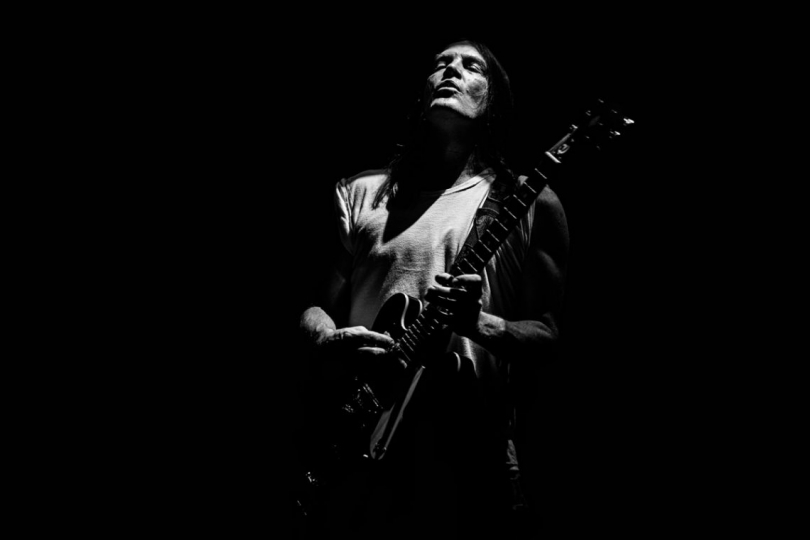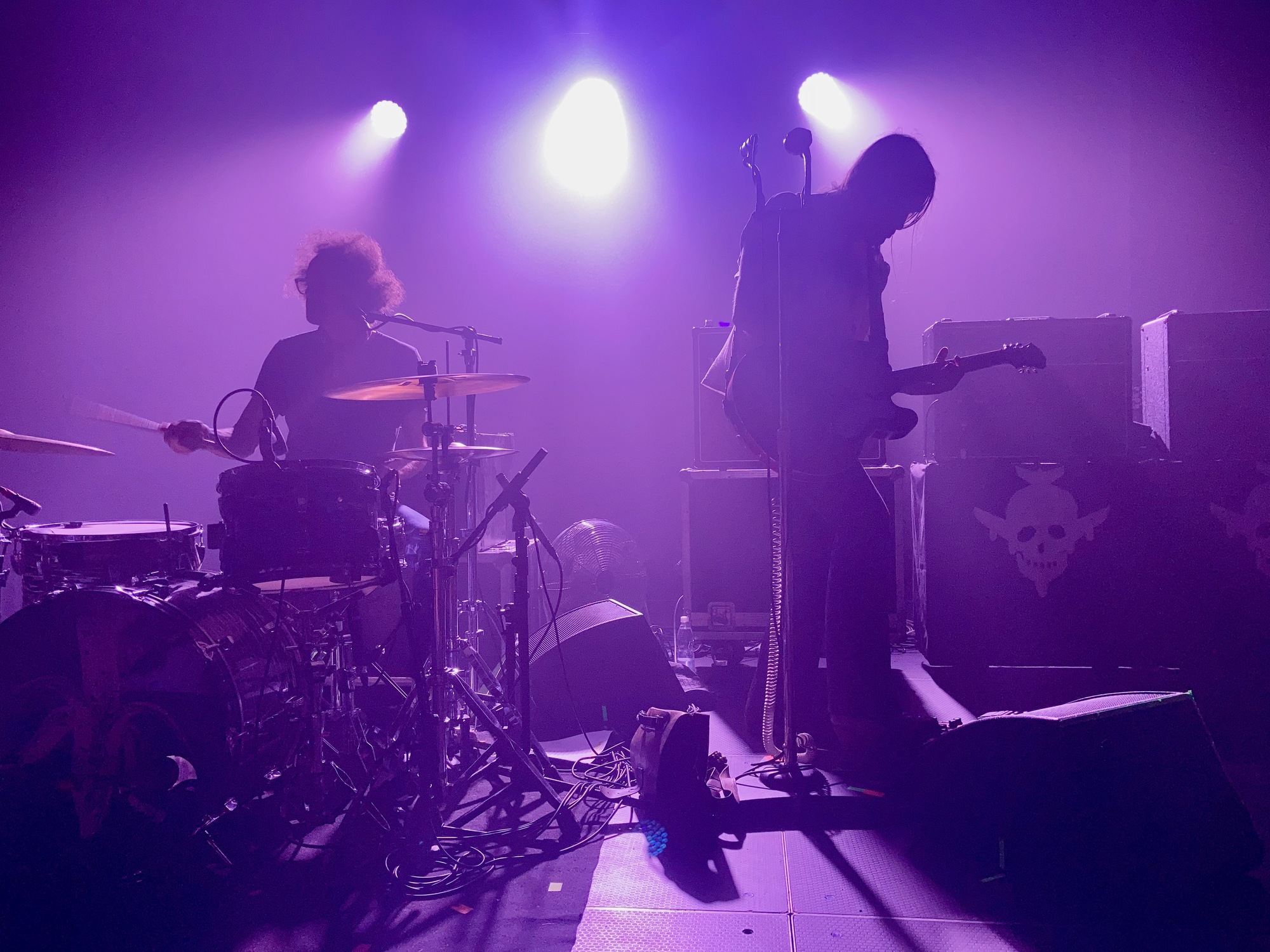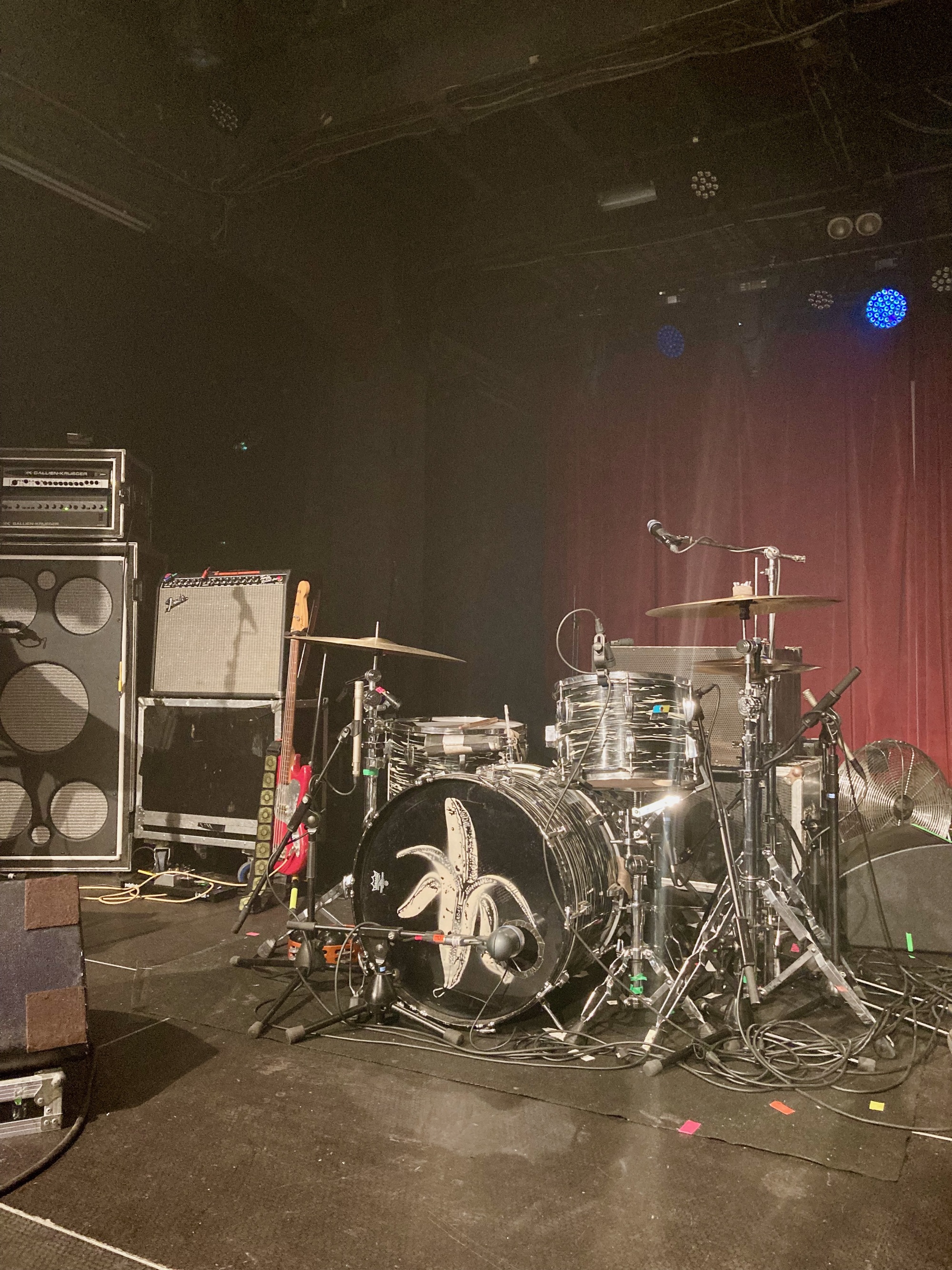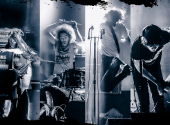
The Dandy Warhols' Courtney Taylor-Taylor: How to Get From Your Ear to Your Heart
The Dandy Warhols gig at the Meet Factory on the 20th of June was a blast. A nice crowd, beautiful atmosphere. It's because they want it—they create it. And you could taste that vibe from the start, from the first notes of the epic "Be-In." And also at the end, when the band shared with the audience, hanging around, hugging and taking photos. Their first record, Come Down, was released in 1995, and they've been on a roll ever since. But a lot has changed in those years, and the band's musical evolution also reflects the changing of our times. Their last album Tafelmuzik Means More When You're Alone came out in 2020, and while it is completely different from the previous records, it is impossible not to recognise their style and vibe. I had the chance and privilege, I must say (being a fan of theirs since the very beginning), to have a conversation with Courtney Taylor-Taylor, leader, singer and guitarist of the band. Courtney, apart from being deeply involved in music and an eclectic artist in various media, is also a wine expert, having his own wine "Chateau Taylor Taylor", and a wine bar, the Old Portland. That's where we started our conversation, from Bergamo, during the Italian leg of The Dandy Warhols European tour.
Are you in Italy now? I know you have your own wine and you enjoy wine. Do you have any favourite Italian wines?
I want to eat some Italian food and drink some Italian wine. I've been looking forward to it for months! You know, I like the usuals: Barolo, Barbaresco, Brunello di Montalcino… well those are very famous wines from Tuscany and Piemonte. But I like all good wine and there is a ton of it in this country.
I would like to ask you a question about your latest Dandy Warhols work, Tafelmuzik Means More When You’re Alone, from 2020. How did this idea get started and is there a reason why such a concept happened exactly in these times?
Well, it started because Peter Holmstrom wanted to make a recording where we used every single instrument we own, and we own probably hundreds of instruments, from toys to antiques, to all sorts of crap. So, we started doing that. But we started that record in 2011, or maybe earlier, maybe it was like 2009. We organised it into dinner music and during COVID we made or found a piece of food for every piece of music. And then we put them in order of, you know, cocktails, then salad, then soup, then a starter, a nine-course meal, and online you can find the recipes that go with each piece of music. And the wine pairing for each composition. It's a whole immersive experience.
Yeah. It has also an extraordinary length, roughly four hours, which makes it look more like a complete music composition rather than single songs…
Which is a good length for a dinner party.
And does the title refer to the ancient table-music tradition, existing since the Egyptians and developed over centuries?
Yeah. That's exactly what it is. It's the same concept as tafelmuzik (German, literally table-music, ed.) from the late Renaissance, early Baroque music period. It is music made to accompany food and conversation over a long, long, long dinner.
Can the context of tafelmuzik be considered a safe escape for an artist today?
Yeah. I mean, it is absolute freedom. That musical form I found, I've always found it to be, very great, pure, because it's even more abstract than music usually is. Music is usually there to make some rather powerful emotion, be embodied in sounds, whereas this is even more abstract than emotion it's, um, textures and flavors of food. And with the feelings accompanying those elements. So, it really is a very amazing and new frontier for people today to try to do that for us, it was very unusual.
Does music somehow embody a role in society? You made an interesting project, a graphic novel co-written by Jim Rugg, called One Model Nation, a story about a fictional 1970s German krautrock band, and set in a chaotic socio-political situation. Do you think music has a way to look inside things, and at the same time outside into the real world?
If you think about it historically, not just music, but the arts in general will tell you how the people feel during any given time. Whereas politics only let you know what the leaders were doing. Politics don't embody any feelings of the people. So yes, of course, music, painting, film, anything: they're truer to the general human condition from any era.
It's all kind of connected. I'm thinking, in this case, of the Bauhaus principle, where all the arts are supposed to be connected and fully functional in one system…
Right! The Bauhaus idea, meaning that you don't have to design anything to be aesthetically pleasing, because if it just simply works extremely well, it will be aesthetically pleasing.

I would like to ask you, what inspires you today to make music. Has something changed in your music and your inspiration during the years, is there something different now that you would listen to or read?
I don't really know. I think what really inspires me to make music is an absence of a certain kind of sound, you know, if you think about our band history when we released records and what they sounded like. Our first EMI record, Come Down, was several years after shoegaze had gone away. And Peter and I, we really didn't feel like that was just it, that shoegaze should just be wiped off the map so easily. So, we made a shoegaze record four years after that, and it was very unfashionable to do that. And we did it anyway because we felt the need for it. And then at the end of the nineties, there were boy bands, girl bands, you know, Spice Girls, Backstreet Boys and all that was going on. There was no real earthy organic (music, ed.). There was no Rolling Stones. There was no Neil Young. There wasn't anything like that. There were no George Harrison records coming out. And so, we made Thirteen Tales of Urban Bohemia because that seemed to be missing. And then, four years later, a new musical wave came out and that sort of opened the door for all: Jack White, The Strokes, Jet, The Vines, all these great rock and roll bands then emerged. And there was a complete lack of Gary Numan, Duran Duran, you know, so we made a synth record and then, you know, there was a tide of tight and very accurate (music, ed.), like Franz Ferdinand, The Bravery and The Killers and all these really great, clear, well-executed and recorded synth-driven rock bands. So, after that, we made a very loose, sloppy and organic, very jammy record, called Odditorium. And on and on. I used to say that I thought of us as the janitors of rock. We were the cleanup crew. We would do the dirty jobs no one else would do.
I think the fact that you are consistent and have continued for years also reflects this kind of spirit. I wanted to ask you, what music do you listen to nowadays?
For current bands, I like the same things everyone likes, you know, the great bands of today are obviously Idles, the Viagra Boys, Wet Leg, Sleaford Mods and Amyl and the Sniffers. I like rock and great guitar inventors, people reinventing guitar music, and using a lot of the late 70s post-punk sounds and approach.
And would you like to collaborate with some of these contemporary musicians; is there somebody, for example, you would like to feature in your records, in the future, or to be featured with?
Oh yeah. I mean, any of those bands I just named would be a hell of a lot of fun to be in a studio with. You know, they're all fantastic. They're all really, truly great and inspiring artists. But I love to be in a studio with anyone great and working with awesome people. We have a record that's almost finished now and now we're going to start reaching out to other artists and try to get people to come play on it with us. So, we'll see who we get. I like really heavy guitar riff music, sort of like Rage Against the Machine and Pantera and I even like the Scorpions, you know? But I have a different thing I want to hear happen with the singing than what they do. So, our new record is very hard rock but with a different vocal approach than those kinds of bands have historically done.
Do you know already when the new album will be released?
Well, I don't know. I would imagine some time next year. I would like to get great guitar players on it. I'd like to get Richard Kruspe from Rammstein. I would like to get Tony Iommi. I would like to get Slash, or Black Francis from Pixies. Or the great Daniel Ash from Bauhaus. You know, all the guitar heroes of my life. I'm gonna reach out to as many of them as I can and see who wants to do it.
Let’s focus now for a moment on The Dandy Warhols evolving arch. How did your creative process mutate over the years?
Well, you know, we've become more of a digital project. We record in a very modern way where we make loops and build our music, our records, from blocks of sounds or beats and build them that way rather than learning songs together as a band and rehearsing them, and then recording them. We do it the digital way, half electronic and then half analog. And it's nice to have all that technology, at our disposal. You know, we don't want to not use it because of some kind of dogma. I think that it’s interesting for some people, and I think some people maybe need it, but we're more concerned with our ears, and how it gets from our ear to our heart. You know, our ears are directly wired to our heart. And we don't really have a lot of bullshit around outside of that gets involved with us at all. We’re just very, um, pragmatic about it. We want to make this shit. We wanna make it feel immediately powerful, no matter what it takes.

In a sense, I think it's also kind of restrictive when you limit yourself, just because “it's rock and roll,” so you cannot use synths because it's rock. And also I believe it doesn't make sense because many rock bands—especially, for example, Suicide—were already using many electronic devices in the seventies.
Absolutely. Well, listen to Rammstein. That is the greatest metal band ever. And, they've got that dude, “Flake”, who is their keyboardist and he's amazing. Those are some of the best-sounding hard metal records in history. And nobody's gonna call bullshit on Rammstein (laughs).
Yes, it's true! And speaking about this change of approach to music, are there some electronic guitar or vocal gear that you use nowadays more than before?
The guitar pedal situation is always changing. You know, with guitar pedals, if you get a new guitar pedal on the right day at the right time, you can plug it in, and it can spawn an entire song or an entire style for a record. There are guitar pedals and then there's a magical, crazy thing that happens. And guitar pedals are getting more and more amazing every year. It's a noticeable leap forward. Peter is in it, with the guitar pedal world. So, he will always have some new inspiring thing.
And what about vocal gear?
Vocally, hm... I think I like to use other people's styles to more comfortably express myself, maybe half the time. I don't really do much in the way of equipment. I have a microphone that I've recently started using. And it's one of those old, long square microphones that David Bowie used to use. And then there's a piece of gear called a fatso, which was an extreme compressor from the late nineties, early 2000s, that we had bought back and then when we built our studio in 2002, we sent it to some sound music recording nerd in LA. to kind of reconfigure it and make it sound more, well, unusual. I've been doing this old “Bowie” mic through a moded Fatso as my main vocal sound. And it's not a weird sound. It's just an incredibly cool sound and it works on my voice really well. That's kind of the only real difference I'm using for vocals.
How would you describe the music you create today? How would you define it?
We make trance music, but we use mostly the same instruments that Simon & Garfunkel or Bob Dylan used in the 70s. It's like vintage rock and roll instrumentation; it's half stoner rock, half trance music, but it's basically trance music. It does a very similar thing to trance music. It attempts to do the same thing, but maybe just a little more emotionally rich, because of the antique sounds that we incorporate.
And please one last question Courtney: do you have any upcoming individual projects of your own?
Yeah. I've got a television show that is “food and wine and rock and roll,” that I'm developing, with my agent Greg now, an agent at ACM. And I'm in development with some guys who are doing animation for my German graphic novel project, as an animated series. So, I'm busy, yeah, you know, I'm a busy guy.
That's cool. I think it's the only way to survive today to keep yourself busy somehow…
Yeah, like a shark, you gotta keep moving, right? If you stop, you sink to the bottom.

If you have found an error or typo in the article, please let us know by e-mail info@insounder.org.


